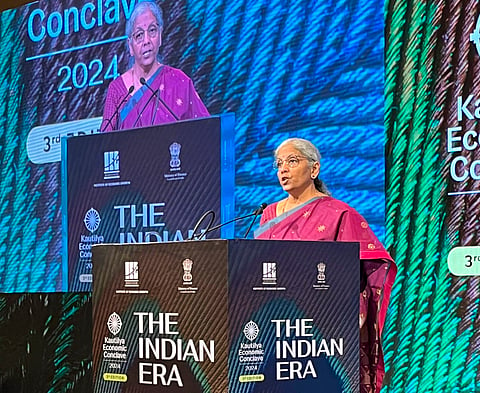

NEW DELHI: India’s per capita income, currently at USD 2,730, is projected to increase by USD 2,000 over the next five years, according to Finance Minister Nirmala Sitharaman.
Speaking at the Kautilya Economic Conclave, she said it took 75 years for India to reach the current level of per capita income. The country has recently achieved a notable milestone by becoming the fifth largest economy globally, moving up from the tenth position within a span of five years.
"India’s creditable economic performance in the recent decade was underscored by its leapfrog from the tenth to the fifth largest economy in a matter of 5 years, sustained high growth rates and maintained inflation well within the comfortable range," Sitharaman said during her address.
Additionally, data indicates a decline in income inequality, with the Gini coefficient for rural India falling from 0.283 to 0.266, and for urban areas from 0.363 to 0.314, she added.
"I expect these improvements to continue as the effects of the last ten years of economic and structural reforms manifest more thoroughly in the data in the coming years as the Covid shock fades from the economy," Sitharaman stated.
As per the Minister, consumption will organically rise over the coming decade. As of now, 43 per cent of Indians are younger than 24 years old, and they have yet to explore their consumption behaviour fully. There will be organic growth in consumption as they become full-fledged consumers. Simultaneously, a rising middle class will pave the way for strong consumption, inflow of foreign investment and a vibrant marketplace.
Speaking of fiscal policies, Sitharaman said that the government continues to uphold its commitment to reducing the fiscal deficit. Aided by buoyant revenue generation, restrained revenue expenditure growth and healthy economic activity, the fiscal deficit is estimated to decline further from 5.6 per cent of GDP in FY24 (provisional actuals) to 4.9 per cent in FY25. The commitment to fiscal discipline will not only help keep bond yields in check but will translate to lower economy-wide borrowing costs, she said.
Sitharaman also highlighted that the development journey will have to contend with the twin challenges of dealing with the legacy emissions of the developed world and managing India’s energy transition.
"The balancing act requires a “whole-of-government” approach and contextualised solutions unique to India. Moreover, India’s energy demand and consumption have something to offer the world, such as the food-to-feed balance," she added.
"By 2047, as India crosses the 100-year mark of independence, the new Indian era will have core characteristics similar to developed countries. Viksit Bharat will usher prosperity not just to Indians but to the rest of the world by becoming central to a vibrant exchange of ideas, technology, and culture," the minister said in her concluding remarks.